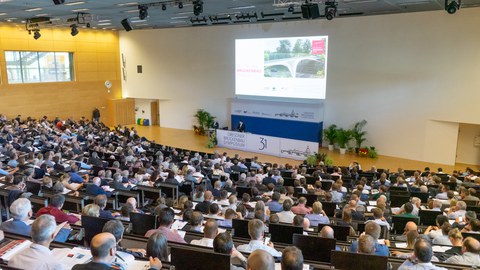Jun 30, 2022
Sustainability as an overarching theme of the major civil engineering conferences in June

View into the fully occupied Audimax in the Lecture Hall Center for the 31st Dresden Bridge Building Symposium
Due to the risks associated with the Corona virus that were in effect in the spring, three major civil engineering meetings were held in June this year. For all three events, after a two-year break, it was finally a return to normality, to lecture halls and conference rooms, a return to personal contact and exchange. All three conferences increasingly turned to the topic of "sustainable construction." Even if the figures given by various researchers on the share of global CO2 emissions differ numerically, it is clear that the construction and operation of buildings is responsible for a significant share of all harmful greenhouse gases emitted worldwide, between 30 and 50 percent in total. The main source of the many harmful greenhouse gases is conventional concrete, which is being used in ever greater quantities. Saving concrete significantly is therefore the goal of many research activities. The solutions are diverse and range from constructive ideas with which components can be significantly smaller in size to the development of alternative building materials that are used instead of concrete.
Many of the papers presented at the conference focused on approaches to avoid or reduce factors that have a negative impact on the climate in the various areas of construction, as well as on the effects of climate change that are already being felt. For example, climatic conditions must be taken into account to a greater extent in construction planning, and buildings must be adapted more to changing conditions and requirements. In hydraulic engineering and also in road construction, increasingly frequent extreme weather conditions with heavy rain and flooding scenarios are playing a major role. The search for alternative building materials or increasing impact stresses on building structures are occupying the attention of building materials experts.
31st Dresden Bridge Building Symposium
The first event was the bridge construction symposium with more than 1000 participants in the auditorium center. Traditionally, the bridge construction symposium brings experts from all over the world to Dresden every year. After the welcoming address by Thomas Schmidt, Saxony's Minister of State for Regional Development, the focus was directly on saving resources by using alternative construction materials for a structural element that is traditionally realized with large quantities of concrete. With his presentation "Bridges on geosynthetic-reinforced abutments - fast, environmentally friendly and cost-effective", MR Prof. Dr. Gero Marzahn from the Federal Ministry of Digital Affairs and Transport in Bonn explained how earth masses available on site were used to produce a support for a bridge structure.
7th Dresden Asphalt Days
With about 200 participants the Dresden Asphalt Days took place on June 09 and 10 in the former conference rooms of the Saxon Parliament in the Dreikönigskirche. Right at the beginning, Prof. Dr.-Ing. Ulf Zander from the Federal Highway Research Institute made it very clear in his keynote speech that asphalt road construction is still not responding sufficiently to climate change. According to his remarks, this concerns both the increasingly extreme environmental influences, which require greater adaptation of the official specifications for road construction in order to be able to continue to guarantee the corresponding durability of road pavements, and the management in the cycle in the procurement of building materials for road construction, without the use of new raw materials. According to him, doing without new raw materials is not only possible, but also a declared goal.
45th Dresden Hydraulic Engineering Colloquium
On June 14 and 15, around 300 participants from the hydraulic engineering industry gathered at the Dresden Congress Center. Traditionally, the topic of water is very much about climate and the environment. With the event title "Sustainability in hydraulic engineering - environment, transport, energy", the urgency of a rethink in the construction industry was also underlined at this congress.
As keynote speaker, right at the beginning of the conference, Prof. Mechtcherine, Director of the Institute for Building Materials at the Technical University of Dresden, stated in his lecture related to the noticeable climate changes: "Nothing can be saved with small incremental improvements, we have to do significantly more!" He gave a very comprehensive overview of the latest developments in resource-saving building materials and processes, especially from the point of view of material savings and environmental compatibility. Cement is the largest contributor to CO2 emissions here, mainly due to the use of huge quantities of concrete in construction.
